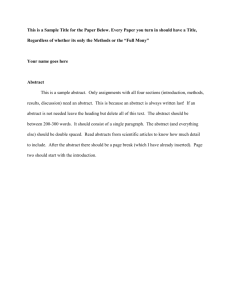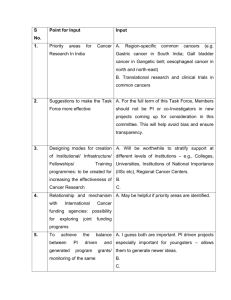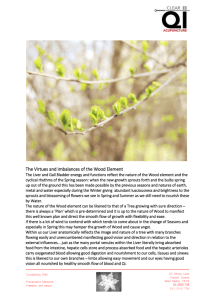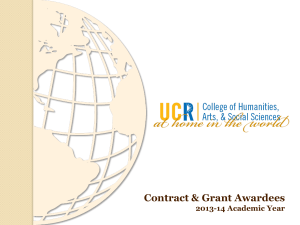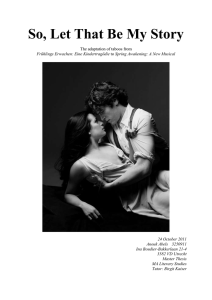final1-final-report-eu-submitted
advertisement
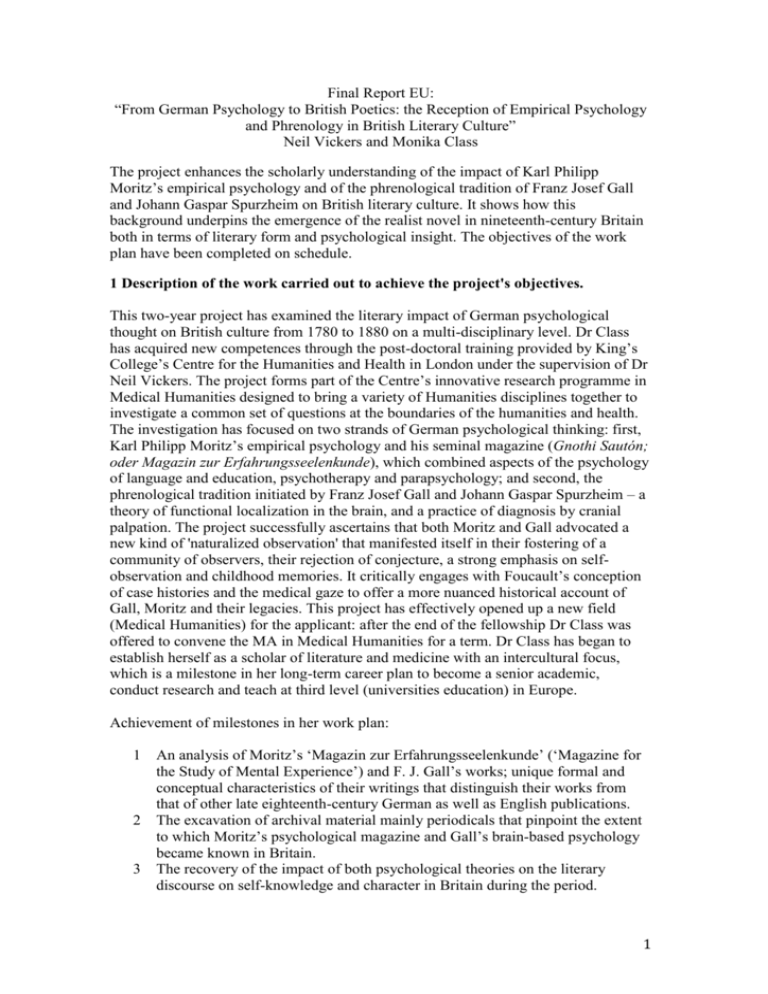
Final Report EU: “From German Psychology to British Poetics: the Reception of Empirical Psychology and Phrenology in British Literary Culture” Neil Vickers and Monika Class The project enhances the scholarly understanding of the impact of Karl Philipp Moritz’s empirical psychology and of the phrenological tradition of Franz Josef Gall and Johann Gaspar Spurzheim on British literary culture. It shows how this background underpins the emergence of the realist novel in nineteenth-century Britain both in terms of literary form and psychological insight. The objectives of the work plan have been completed on schedule. 1 Description of the work carried out to achieve the project's objectives. This two-year project has examined the literary impact of German psychological thought on British culture from 1780 to 1880 on a multi-disciplinary level. Dr Class has acquired new competences through the post-doctoral training provided by King’s College’s Centre for the Humanities and Health in London under the supervision of Dr Neil Vickers. The project forms part of the Centre’s innovative research programme in Medical Humanities designed to bring a variety of Humanities disciplines together to investigate a common set of questions at the boundaries of the humanities and health. The investigation has focused on two strands of German psychological thinking: first, Karl Philipp Moritz’s empirical psychology and his seminal magazine (Gnothi Sautón; oder Magazin zur Erfahrungsseelenkunde), which combined aspects of the psychology of language and education, psychotherapy and parapsychology; and second, the phrenological tradition initiated by Franz Josef Gall and Johann Gaspar Spurzheim – a theory of functional localization in the brain, and a practice of diagnosis by cranial palpation. The project successfully ascertains that both Moritz and Gall advocated a new kind of 'naturalized observation' that manifested itself in their fostering of a community of observers, their rejection of conjecture, a strong emphasis on selfobservation and childhood memories. It critically engages with Foucault’s conception of case histories and the medical gaze to offer a more nuanced historical account of Gall, Moritz and their legacies. This project has effectively opened up a new field (Medical Humanities) for the applicant: after the end of the fellowship Dr Class was offered to convene the MA in Medical Humanities for a term. Dr Class has began to establish herself as a scholar of literature and medicine with an intercultural focus, which is a milestone in her long-term career plan to become a senior academic, conduct research and teach at third level (universities education) in Europe. Achievement of milestones in her work plan: 1 2 3 An analysis of Moritz’s ‘Magazin zur Erfahrungsseelenkunde’ (‘Magazine for the Study of Mental Experience’) and F. J. Gall’s works; unique formal and conceptual characteristics of their writings that distinguish their works from that of other late eighteenth-century German as well as English publications. The excavation of archival material mainly periodicals that pinpoint the extent to which Moritz’s psychological magazine and Gall’s brain-based psychology became known in Britain. The recovery of the impact of both psychological theories on the literary discourse on self-knowledge and character in Britain during the period. 1 4 5 The reconsideration of Michel Foucault’s account of the rise of psychology as a discipline which had as its primary aim the regulation and subordination of individuality on behalf of the state. An account of the interconnections between Gall’s and Moritz’s theories and the impact on a wider range of realist novels will be investigated. 2 Main Results • The project makes an important contribution to the history of case histories, a genre widely used in a variety of disciplines ranging from law, theology, and medicine to literature. It builds on the works by Lorraine Daston and Gianna Pomata that establishes the case histories were current under a variety of designations, especially as 'observations'. The project shows that Gall and Moritz naturalized case histories: 1 - the typical separation of conjecture (Daston 2011) from observation transformed in their hands into observations with the least reflection possible (Moritz) or a replacement of visual evidence with palpation (Galls); 2 - the usual sharing of cases extended in Moritz's project to any lay observer who could write and Gall invited his virtual community of observers to include animal skulls samples; 3 – the characteristic emphasis on singular, first-hand evidence led to new requirements for observers: Moritz demanded from observers to analyse the growth of their minds from early childhood and Gall used his childhood memories to support his claims as a born observer. The impact of Moritz's and Gall's naturalized case histories helped shape the character constructions in British novels, such as Dickens's David Copperfield, Pickwick Papers, Bleak House and others. • Dr Class designed and organized an international symposium ‘Medical Case Histories as Genre’ on 2 July 2013, the proceedings of which are under consideration for publication with the peer-reviewed journal ‘Literature and Medicine’ edited by Dr. Belling. Update (9 December 2013): The special cluster has been accepted for publication and will appear in spring 2014. • Dr Class has been approached as a specialist in literature and medicine to participate in peer review and the publication of reviews, for instance, ‘Depression and Melancholia, 1660 – 1800’ BARS Reviews forthcoming 2013, the journal European Romantic Review; the publishing house Bloomsbury Academic. She was invited to speak on ‘Romantic Narratives of Illness’ at Romantic Realignments Oxford University 2012. • Dr Class has completed four articles. Monika Class, 'Medical Case Narratives across Disciplinary and National Boundaries around 1800' Anglistentagsband: New Trends in Romantic Studies, eds. Rosa Karl, Stefanie Fricke und Gerold Sedlmayr (forthcoming with Wissenschaftlicher Verlag Trier, 2013) Monika Class, ‘Moritz, Goethe und Kasuistik’ to be submitted to a leading journal in German studies Monika Class ‘Gall and Observation’ Bodyscapes ed. Gerold Sedlmayr forthcoming with WVT 2013. Monika Class, ‘Coleridge and Phrenology’, Grasmere 2011: Selected papers from the Wordsworth Summer Conference, ed. Richard Gravil, Penrith: Humanities-Ebooks, 2011, 151-161. http://www.kcl.ac.uk/innovation/groups/chh/events/Medical-Case-Histories-Workshop.pdf 2
